Crypto World
Michael Saylor’s Strategy buys 1,142 Bitcoin
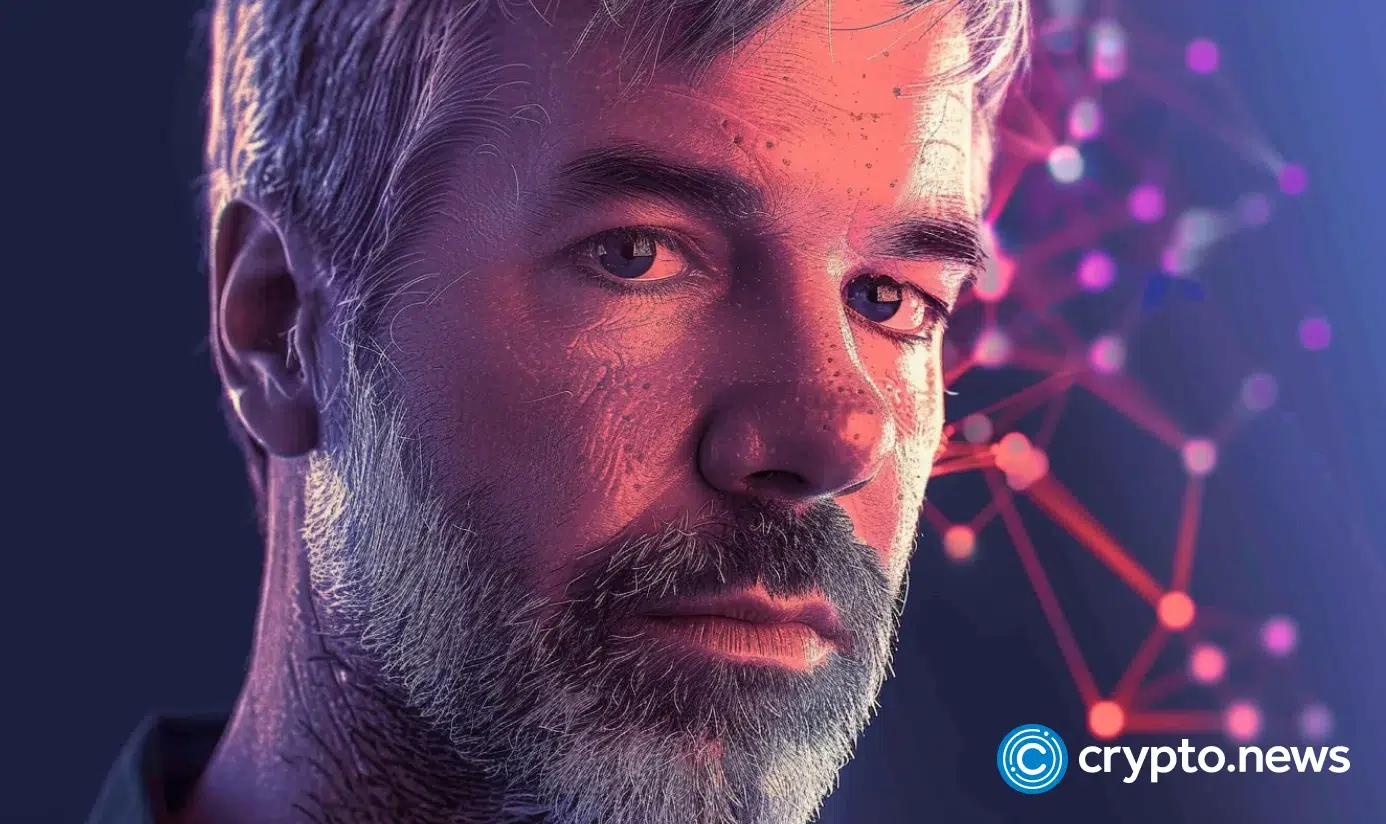
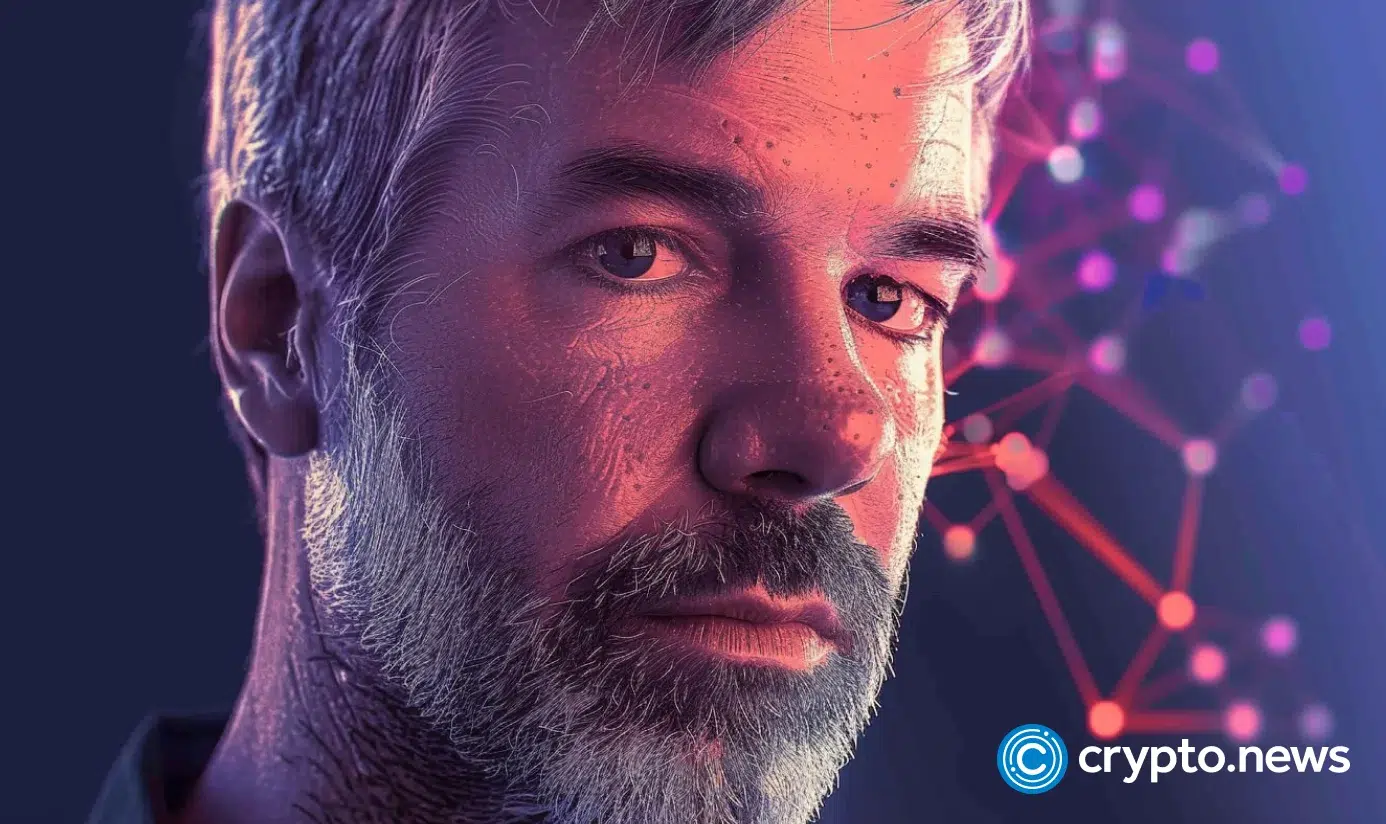
Michael Saylor continued his dollar-cost averaging last week, even as Bitcoin tumbled to its lowest level since 2024 and losses soared.
Summary
- Strategy continued its Bitcoin accumulation as its unrealized losses rose.
- The company bought 1,142 coins last week, bringing its total holdings to 714,644.
- Wall Street analysts are highly bullish on the MSTR stock.
Strategy continues Bitcoin accumulation
In a statement, Saylor said that his company bought 1,142 Bitcoin (BTC) at the average price of $78,815. This purchase brought its total Bitcoin holdings to 714,644 valued at over $49 billion.
Data compiled by Bitcoin Treasuries shows that its average cost per Bitcoin stood at over $76,052. With the Bitcoin price trading at $69,000, it has suffered a nearly 10% loss. More data shows that it has suffered a $5 billion in unrealized losses.
In a report last week, the company said that its operating loss rose to over $17.4 billion as the Bitcoin price plunged. Its net loss soared to $12.4 billion, a trend that may persist if BTC remains in a downtrend.
Worse, Strategy continues to dilute its shareholders by using its common stock to buy Bitcoin. Data show it has more than $7.9 billion in authorized shares to buy.
It also has over $20 billion in available STRK preferred shares. As a result, the total outstanding shares jumped to over 300 million, up from 77 million in 2021.
Wall Street analysts are optimistic of MSTR stock
Still, Wall Street analysts are starting to turn bullish on the Strategy stock, citing the potential BTC rebound. Cantor Fitzgerald analyst maintained an overweight rating with a target of $192.
BTIG analysts have a target of $250, while Canaccord Genuity, Mizuho, and Truist Financial see it soaring to $185, $403, and $268. Data compiled by MarketBeat shows that the consensus target among Wall Street analysts is $347, up by 176% from the current level.
MSTR’s stock recovery will depend on Bitcoin’s rebound. A strong Bitcoin rally will lead to a higher stock price, as it happened on Friday. Strategy jumped by nearly 30% as Bitcoin moved from $60,000 to over $70,000.
Crypto World
Bitcoin Recovers $70,000 Levels After Multi-Billion Dollar Crash
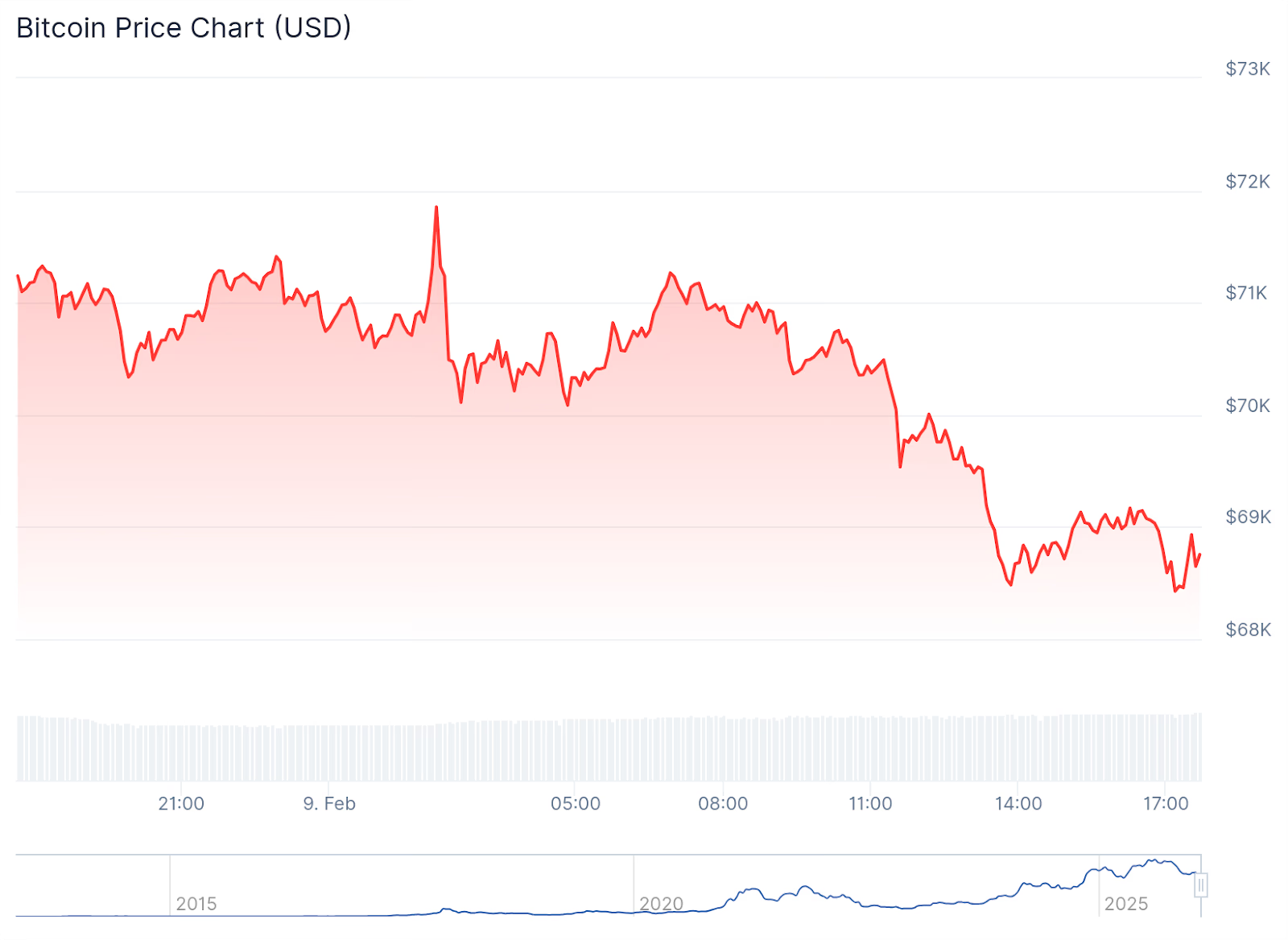
BTC is trading sideways around $68K-$71K since Thursday’s flash crash, but losses across major tokens continue.
Crypto markets saw a modest bounce after last week’s broad sell-off, though the sector remains in the red. Total market cap is down 2.2% today and most large-cap crypto assets are seeing losses on the daily and weekly timeframes.
As of Monday morning, Bitcoin (BTC) was still down about 3% on the day, trading near $69,280, after briefly dipping as low as $60,000 on Thursday.

Ethereum (ETH) is also down today, with 3.8% losses over the past 24 hours to trade just above $2,000, extending its seven-day losses to roughly 12%.
All remaining top-10 tokens by market capitalization were in the red as well, with Solana (SOL) leading losses, down about 4% on the day.
Echo of May 2022
Glassnode analysts said in a post on X today, Feb. 9, that market positioning for Bitcoin remains defensive across spot and derivatives markets, as well as per on-chain metrics, with any recovery dependent on a meaningful return of spot demand.
They added that while fundamental network activity is strengthening, profit-and-loss conditions continue to weaken, demonstrating only soft demand and limited profitability.

At $70,000 levels, unrealized losses account for about 16% of Bitcoin’s market cap, echoing the situation in early May 2022, glassnode noted, referring to heavy deleveraging that preceded the Terra-driven drawdown at the time.
According to the Crypto Fear & Greed Index, investor sentiment remains in the “extreme fear” zone this morning, where it has been for most of the last month.
Big Movers and Liquidations
Looking at the top-100 assets by market cap, Rain (RAIN) and the Trump family’s World Liberty Financial (WLFI) outperformed the market up 11% and 6% respectively.
On the downside, MemeCore (M), Bittensor (TAO), and Ondo (ONDO) were the three weakest performers, all down about 6% on the day.
CoinGlass data showed continued forced deleveraging, with roughly $344 million in leveraged crypto positions liquidated over the past 24 hours, a far cry from the multi-billion liquidations that shook the market late last week amid quickly falling prices.
By asset, BTC led liquidations with approximately $182 million, followed by ETH at around $71 million.
ETFs and Macro Conditions
For the week ending on Feb. 6, spot Bitcoin exchange-traded funds recorded $318 million in net outflows, and ended the week with daily net inflows above $371 million. Cumulative net inflows stand at $54.7 billion, according to data from SoSoValue.
Spot Ethereum ETFs posted $166 million in weekly net outflows during the same timeframe, with net outflows every day last week but Feb. 3, while cumulative net inflows are currently around $11.8 billion.
In macro markets, U.S. Treasury yields moved higher to start the week as investors braced for a wave of delayed U.S. economic data. The 10-year Treasury yield rose to 4.236%, while the 30-year climbed to 4.889%, CNBC reports.
Markets are focused on the January nonfarm payrolls report, now scheduled for release this Wednesday, Feb. 11, which is expected to show job growth of 60,000, with the unemployment rate holding steady at 4.4%.
Crypto World
6 Leading Dogecoin mining platforms driving the 2026 cloud mining trend, and helping people to earn passive income


Disclosure: This article does not represent investment advice. The content and materials featured on this page are for educational purposes only.
Cloud mining is emerging as the mainstream way to participate in Dogecoin, offering simpler, faster access for new crypto users.
Summary
- Dogecoin mining shifts toward cloud platforms in 2026 as rising costs and difficulty reduce traditional hardware appeal.
- High electricity, maintenance, and difficulty push everyday investors toward simpler cloud-based Dogecoin mining options.
- Cloud mining emerges as a mainstream entry point for Dogecoin users seeking efficient, low-barrier crypto participation.
Dogecoin’s (DOGE) development journey is vastly different from that of other cryptocurrencies like Bitcoin and Ethereum. Unlike them, Dogecoin didn’t start with a complex technical whitepaper or the ambition to disrupt traditional financial systems. Instead, it began as a humorous and community-driven project, quickly capturing global attention with its lighthearted and approachable nature.
With fast transaction confirmation times and strong community support, Dogecoin has grown from an internet meme into a significant player in the cryptocurrency market, demonstrating its unique value.
As Dogecoin continues to mature, the ways in which users participate in its ecosystem are also evolving. Particularly in the field of mining, traditional hardware mining is gradually being replaced by a more efficient and convenient method — cloud mining. In 2026, cloud mining is becoming a mainstream trend, opening up new doors for everyday investors to participate in the cryptocurrency space with ease.
The current state of Dogecoin mining: Challenges of traditional mining
While Dogecoin can still be mined through traditional hardware, this process is no longer as straightforward as it once was. As the Dogecoin network expands, several challenges have emerged:
1. Increased Mining Difficulty: As more miners join the network, mining has become more challenging, making it harder for regular users to earn significant rewards.
2. High Electricity Costs: Mining equipment consumes a lot of electricity, making operational costs a major concern for miners.
3. Complex Hardware Maintenance: Mining rigs require regular maintenance, and aging hardware can reduce efficiency, leading to additional repair and replacement costs.
These challenges have made traditional mining less appealing, especially for everyday investors with limited technical knowledge or financial resources. As a result, cloud mining has emerged as an attractive alternative.
1.Hashbitcoin cloud mining: The future of cryptocurrency mining in 2026
Cloud mining is changing the cryptocurrency mining landscape. It eliminates the need for expensive hardware purchases and the hassle of managing electricity consumption. With cloud mining, users simply register on a platform, choose a mining contract, and let remote servers handle the mining process, generating daily rewards.
Hashbitcoin, as a leading cloud mining platform, offers a simple, efficient, and legally compliant mining solution. Here’s how to get started with Hashbitcoin:
1. Register an Account: Sign up using an email and complete KYC verification to secure your account.
2. Claim Free Hashpower: New users receive $15 worth of free hashpower to start mining with zero cost.
3. Choose a Mining Contract: Select a contract that suits a particular budget and preferences.
4. Earn Daily Rewards: Once the contract is active, daily cryptocurrency rewards will be automatically received.
5. Withdraw or Reinvest: Withdraw earnings anytime or reinvest them to purchase more hashpower for greater returns.
Hashbitcoin mining profit examples
Below are some examples of mining contracts and their potential returns on the Hashbitcoin platform:
Mining Plan
Investment
Contract Term
Daily Rewards
Total Return (Principal + Profit)
Newbie Mining Plan
$200
1 Day
$7
$200 + $7
Avalon A15 Pro Mining Rig
$1,200
2 Days
$43.2
$1,200 + $86.4
BitDeer SealMiner A2
$3,600
3 Days
$136.8
$3,600 + $410.4
Avalon Nano 3S Miner
$8,000
2 Days
$344
$8,000 + $688
Antminer S23 Hyd
$16,800
3 Days
$924
$16,800 + $2,772
Whatsminer M63S (390T)
$33,000
2 Days
$2,145
$33,000 + $4,290
Antminer E9 Pro
$58,000
1 Day
$5,104
$58,000 + $5,104
Visit Hashbitcoin now to claim a $15 free hashpower bonus and choose the perfect mining contract.
Other recommended cloud mining platforms
In addition to Hashbitcoin, here are some other excellent cloud mining platforms worth exploring:
2. EcoHash Global — A pioneer in green mining
EcoHash Global focuses on sustainable mining, utilizing wind and solar power for its data centers. The platform offers free trial hashpower and real-time performance monitoring, making it an ideal choice for environmentally conscious users.
3. SmartMine USA — AI-powered smart mining
SmartMine USA leverages artificial intelligence to dynamically allocate hashpower to the most profitable cryptocurrencies. The platform adheres strictly to U.S. regulations and supports mobile operations, providing users with a safe and convenient mining experience.
4. QuantumMiner — High-performance flexible contracts
QuantumMiner offers flexible mining contracts and transparent earnings reports. With AI optimization and eco-friendly servers, it ensures efficient and sustainable cryptocurrency mining.
5. PeakHash Cloud — Beginner-friendly platform
PeakHash Cloud features a simple interface and easy contract management, making it ideal for beginners. The platform offers free trial hashpower and daily payouts, making it an excellent option for those seeking passive income.
6. TitanHash Pro — Mobile AI mining
TitanHash Pro combines AI-powered optimization with mobile and web access, allowing users to monitor their earnings and manage their mining contracts effortlessly. The platform automatically allocates hashpower to the most profitable projects, maximizing returns for users.
Why cloud mining is the future of cryptocurrency mining
1. No Hardware Required: No need to purchase expensive mining rigs, significantly lowering the barrier to entry.
2. Time and Effort Savings: Platforms handle all technical maintenance, electricity management, and other operational tasks.
3. Eco-Friendly Mining: Many platforms now use renewable energy sources, reducing carbon emissions and supporting sustainability.
4. Flexible Contracts: Users can choose from a variety of mining contracts based on their budget and preferences.
5. Global Compliance: Leading platforms like Hashbitcoin and SmartMine USA operate in legally regulated jurisdictions, ensuring safety and transparency for users.
How to start the cloud mining journey in 2026
1. Choose a Reliable Platform: Select a trusted cloud mining platform like Hashbitcoin or EcoHash Global.
2. Register and Complete KYC Verification: Secure an account and ensure compliance with regulations.
3. Claim Free Hashpower: Use the free trial hashpower provided by the platform to start mining risk-free.
4. Select the Right Mining Contract: Choose the best plan based on budget and expected returns.
5. Monitor Earnings and Withdraw: Track earnings in real-time via mobile or web dashboards, and withdraw or reinvest as needed.
Conclusion: The golden age of cloud mining has arrived
In 2026, cloud mining is reshaping the cryptocurrency industry. With advancements in artificial intelligence, the integration of renewable energy, and the convenience of mobile access, cloud mining has become an efficient, eco-friendly, and accessible way to earn cryptocurrency.
As an industry leader, Hashbitcoin stands out with its legal compliance, $15 free hashpower bonus, AI-driven mining technology, and transparent operations, making it the go-to platform for both beginners and experienced investors. Similarly, platforms like EcoHash Global, SmartMine USA, and QuantumMiner offer safe, reliable, and sustainable cloud mining services to a global audience.
Whether someone is new to cryptocurrency or a seasoned investor, cloud mining offers a low-risk and lucrative way to earn passive income.
For more information, visit the official website, and start the cloud mining journey.
Disclosure: This content is provided by a third party. Neither crypto.news nor the author of this article endorses any product mentioned on this page. Users should conduct their own research before taking any action related to the company.
Crypto World
BTC climbs above $70,000 as Bernstein makes bull case


Breaking a familiar pattern, bitcoin is on the rise during the U.S. session, climbing to $70,800 after falling to just above $68,000 earlier in the day.
Bitcoin is now higher by 0.5% over the past 24 hours, with ether , XRP and solana ahead closer to 1.5% over the same time frame.
Risk assets are generally in the green on Monday, with the Nasdaq up 1% and the S&P 500 up 0.5%. Gold is ahead 1.9% to $5,075 per ounce, and silver is up 7.4% to $82.50 per ounce.
“What we are experiencing is the weakest bitcoin bear case in its history,” wrote Bernstein’s Gautam Chhugani, reiterating the firm’s $150,000 year-end price target on bitcoin.
“When all stars are aligned, [the] Bitcoin community manufactures a self-imposed crisis of confidence,” Chhugani continued. “Nothing blew up, no skeletons will unravel; [the] media is back again to write an obituary.”
“Time,” said Chhugani, “remains a flat circle on Bitcoin.”
Getting a bit more technical, Schwab’s Jim Ferraioli said it is helpful to look to bitcoin miners to determine when the bottom is in.
“Previous selloffs have usually bottomed near bitcoin’s cost of production,” said Ferraioli. “Miners with less efficient equipment will often shut down operations temporarily … We can see this in real time by watching the mining difficulty adjustment — as more miners leave the network, difficulty falls. Once it starts to rise again, that is confirmation the bottom may be in.”
Indeed, CoinDesk reported earlier that bitcoin mining difficulty just dropped by its largest amount since 2021 as at least some miners did capitulate to plunging prices.
Crypto stocks move higher
Crypto platform Bullish (BLSH) is leading the sector higher on Monday with a 14..2% gain. Other big advancers include Galaxy Digital (GLXY), up 8.2% and Circle Financial (CRCL), up 5.1%. Strategy (MSTR) is up 3% and Coinbase (COIN) 1%.
Bitcoin miners who have pivoted to AI infrastructure are posting large gains as well as Morgan Stanley initiated positive coverage on TeraWulf (WULF) and Cipher Mining (CIFR) — both are up 14%. Hut 8 (HUT), IREN (IREN) and Bitfarms (BITF) are each ahead about 7%.
Crypto World
Bitcoin & Ethereum News, Crypto Prices & Indexes

Bitcoin (CRYPTO: BTC) steadied as Wall Street opened on Monday, marking a calmer exit from an earlier burst of volatility while gold extended its march toward February highs. Traders surveyed a landscape where risk-on catalysts were scarce and liquidity appeared to coalesce around key price levels. In this environment, analysts highlighted a potential range-bound dynamic for BTC, with buyers and sellers evaluating the same technical anchors that have governed recent moves. The broader macro backdrop—dovish whispers on inflation and a wary risk appetite—helped anchor prices as investors awaited clearer directional cues.
Key takeaways
- Bitcoin is expected to bounce within a defined range, with Fibonacci levels shaping the near-term support and resistance boundaries after a spell of pronounced volatility.
- The Coinbase Premium Index briefly flipped to positive territory for the first time in four weeks, suggesting a narrowing price gap between Coinbase’s BTC/USD and Binance’s BTC/USDT pairs.
- On-chain data point toward defensive market behavior, as mean exchange outflows spike and large holders continue accumulating coins off exchanges.
- Analysts describe a broad risk-off stance across spot, derivatives, ETFs, and on-chain indicators, reinforcing a cautious mood despite occasional shifting signals.
- Whale activity is being watched closely, with CryptoQuant noting aggressive accumulation patterns on Binance during a period of price testing near the upper range.
Tickers mentioned: $BTC
Sentiment: Bearish
Price impact: Neutral
Trading idea (Not Financial Advice): Hold
Market context: The current phase sits within a broader environment of liquidity questions, cautious positioning, and mixed signals from on-chain data, as traders weigh potential catalysts and macro developments that could reaccelerate price discovery.
Why it matters
The near-term trajectory for Bitcoin remains tethered to a delicate balance between selling pressure and the willingness of large buyers to step in. As BTC hovers near technical levels, traders are parsing whether current price action represents a genuine base formation or a pause before the next leg of directional movement. The combination of subdued volatility on the hourly time frame and rising on-chain activity around key levels suggests that market participants are preparing for a potential breakout—but only if liquidity and demand align at the right junctures.
On the exchange front, the Coinbase Premium Index’s move back into positive territory, albeit briefly, adds texture to the narrative. The metric, which tracks the relative pricing between Coinbase’s BTC/USD and Binance’s BTC/USDT pairs, has historically offered a rough proxy for where demand is strongest across major venues. A short-lived positive reading can signal shifting demand dynamics or a reevaluation of where liquidity will materialize first in a range-bound regime. Yet observers caution that a temporary tilt does not guarantee a sustained updraft, especially when broader risk-off signals persist elsewhere in crypto markets.
From an on-chain perspective, CryptoQuant documented a notable intake of coins away from exchange wallets, a classic hallmark of accumulation by large holders during periods of price consolidation. The narrative—described in the Quicktake piece as “accumulation during capitulation”—frames current activity as a potential precursor to a support base that could anchor prices if demand steadies. In tandem, the two-week moving average of mean exchange outflows reached 13.3 BTC per withdrawal on Feb. 8, a level that underscores the scale at which investors have been moving coins off centralized venues. Taken together, these signals hint at a more nuanced dynamic than simple momentum-driven moves, where hedging and reserve-building among market participants may provide a floor even as sentiment remains cautious.
“The market is currently witnessing a classic ‘accumulation during capitulation’ scenario,” CryptoQuant analysts wrote, noting that while sentiment remains fearful, the surge in mean exchange outflows points to active buying by large players.
“While sentiment is fearful, the sharp rise in the Mean Exchange Outflow confirms that large-scale investors are aggressively buying and withdrawing Bitcoin, signaling potential support formation at these levels.”
Beyond BTC alone, industry watchers pointed to a persistent risk-off tone across the ecosystem. Glassnode’s Market Pulse characterized conditions as defensive across spot, derivatives, ETFs, and on-chain indicators, noting compressed profitability and negative capital flows alongside elevated hedging demand after recent repricing. While some signals hint that selling pressure could be moderating, analysts emphasized that a durable rebound would likely require renewed spot demand capable of lifting prices above recent lows. The overall mood, while not uniformly bearish, remains cautious, with players calibrating risk management and liquidity considerations as macro narratives continue to evolve.
In the background, gold referenced a similar tension in risk appetite, continuing a broader push toward safe-haven assets as investors weigh the trajectory of rates and inflation expectations. The precious metal’s move toward new month-to-date highs provided a contrasting backdrop to crypto markets, highlighting the ongoing interplay between traditional assets and digital markets in a mixed macro environment.
What to watch next
- BTC price action around the defined Fibonacci levels: watch for a decisive break above or below current bands to confirm the range-bound thesis or signal a breakout.
- Movement in the Coinbase Premium Index: a sustained positive reading or a reversion could provide early hints about shifting exchange demand dynamics.
- On-chain accumulation signals: monitor changes in mean exchange outflow and large-holder activity that could indicate loosening or tightening supply pressure.
- Glassnode Market Pulse updates: any shift toward risk-on indicators or renewed profit-taking could influence near-term sentiment and liquidity flows.
Sources & verification
- TradingView BTCUSD price data on the BITSTAMP feed used to gauge volatility and range formation.
- CryptoQuant: Coinbase Premium Index data showing the index behavior around February 2026.
- CryptoQuant Quicktake: Bitcoin Aggressive Whale Accumulation on Binance and related discussion of capitulation-era accumulation patterns.
- Glassnode: Market Pulse report for February 2026, describing risk-off conditions across spot, derivatives, ETFs, and on-chain metrics.
- Public posts on StefanB’s X feed and CW8900’s tweet, illustrating trader sentiment and real-time micro-structure signals in BTC volatility and liquidity.
Bitcoin price action in a quiet range as momentum ebbs
Bitcoin (CRYPTO: BTC) has settled into a quiet framework after an eventful period, with price momentum cooling as traders await catalysts that could tip the balance toward a new trend. The market’s current complexion leans toward a defined range, with technical observers identifying Fibonacci retracement levels as the principal scaffolding around which near-term price action is likely to rotate. The absence of a clear directional impulse has encouraged participants to posture for a breakout or a sustainable pullback, depending on which side of the spectrum liquidity and demand prefer to emerge.
Analysts on X and other analytics platforms have highlighted a convergence of signals that are consistent with a cautious, range-bound stance. A notable commentary from StefanB underscored the idea that the market might be building liquidity into critical levels, a scenario often observed after episodes of elevated volatility. In practical terms, that means traders are watching price action near well-defined support and resistance horizons, waiting for a decisive move that could establish a new baseline for the next leg of the cycle. As the price slices through these thresholds, a sustained shift in volatility could either validate the range-play hypothesis or usher in a fresh wave of liquidity that drives BTC beyond the current confines.
On-chain data contribute a complementary perspective. The Coinbase Premium Index’s recent move into positive territory, even if temporary, points to a shifting balance of demand across major venues. The metric’s trend, combined with CryptoQuant’s discussion of aggressive whale accumulation on Binance, paints a more nuanced picture than simple speculation about price—one in which large players appear to be consolidating positions in preparation for potential price resilience. The argument for accumulation is reinforced by the reported rise in mean exchange outflows, a signal that investors are methodically removing coins from centralized exchanges to reduce selling pressure and preserve optionality as prices test nearby resistance.
Still, the broader market mood remains cautious. Glassnode’s Market Pulse notes that profitability across spot and derivatives has been compressed and hedging demand remains elevated, underscoring the fragility of any optimistic takeaway. In this environment, even as some indicators hint at underlying support, the absence of robust spot-driven demand means any upside may depend on a convincing uptick in risk appetite or a surprising development in macro data that redefines the risk-reward calculus for crypto assets.
Gold’s ongoing strength adds a macro layer to the discussion. As bullion tests new highs for the month, investors are reminded of the complex interplay between traditional assets and digital markets. The current cross-currents—ranging from inflation expectations to liquidity dynamics—highlight why BTC’s trajectory remains highly context-dependent, with a broad spectrum of catalysts capable of reshaping investor positioning in the short to medium term. The narrative continues to emphasize caution and disciplined risk management, even as people remain vigilant for a breakout that could unlock a fresh phase of price discovery.
//platform.twitter.com/widgets.js
Crypto World
Why Bitcoin Crashed Over 10% in One Week
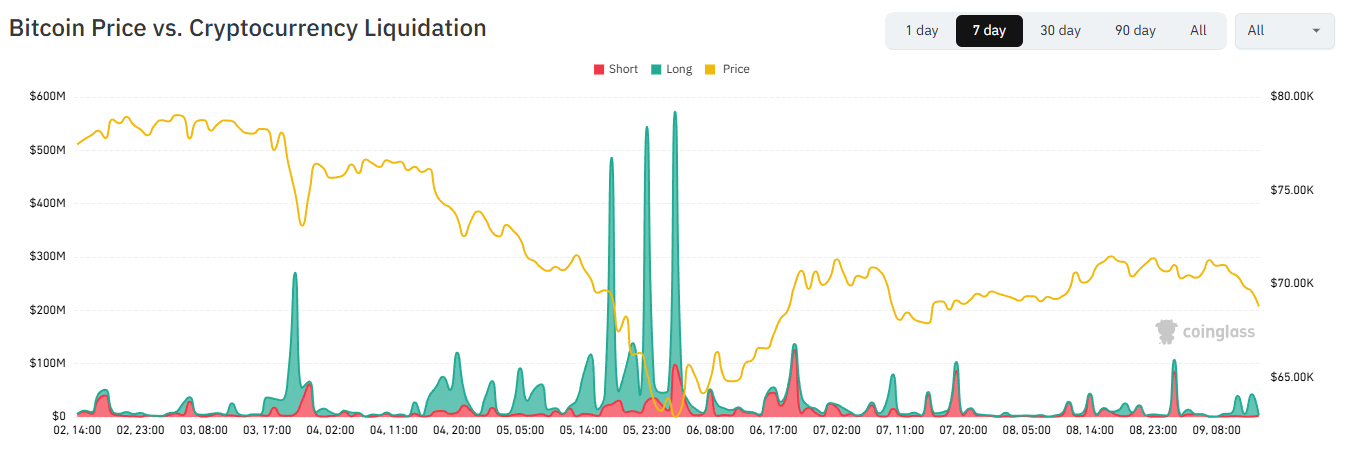
Despite BTC’s rebound from a brief dip to $60,000, retail investor sentiment remains firmly in the “extreme fear” zone.
The crypto market went through another round of wild swings in early February after Bitcoin suddenly plunged to the low-$60,000s in just a few hours on Feb. 5, dragging the rest of the market down with it, before bouncing back to near $70,000.
As of Monday morning, the largest cryptocurrency by market cap is trading around $68,860, down 3.2% in the past 24-hours and almost 12% over the past seven days.

Data from Coinglass shows more than $2 billion in leveraged crypto positions were liquidated in that short window on Thursday, mostly made up of long bets forced to close as prices fell. That wave of automatic selling pushed the slide further than fundamentals alone would suggest.
Jeff Park, a Bitwise portfolio manager, suggested on X on Thursday evening that a lot of the indiscriminate selling seemed to come from multi-strategy hedge funds running delta-hedged trades “possibly with growth equity correlations spillovers.”
Hello from Hong Kong
Parker White, chief investment officer at DeFi Development Corporation, wrote in an X post several hours after Park that the market crash was probably triggered by the sudden collapse of Hong Kong hedge funds, as The Defiant previously reported.
Those funds held call options in IBIT, BlackRock’s spot Bitcoin exchange-traded fund and one of the largest in the market, which saw about $10.7 billion in trading that day — nearly double its previous record — with roughly $900 million in options premiums changing hands.
White suggested that Asia-based hedge funds had run a leveraged IBIT options trade funded in yen, added more leverage after losses, got hit by funding costs and silver trades, and then the final Bitcoin move triggered the collapse.
“We know that Asian traders, particularly in China, have been deeply involved in the Silver and Gold trade. Silver was down 20% today, which was the 2nd largest 1 day move in a very long time (largest on Jan 30). We also know that the JPY carry trade has been unwinding at an increasingly rapid pace,” White wrote.
But if the liquidation actually happened, it won’t show up in 13F filings — quarterly reports that disclose institutional holdings — until 45 days after the quarter ends, so mid‑May is the earliest the full picture could emerge.
Tanisha Katara, founder of Katara Consulting Group, echoed the sentiment, noting in commentary for The Defiant that institutional products like ETFs can accelerate both rallies and sell-offs.
She noted that U.S. spot Bitcoin ETFs, which provide streamlined access to the crypto market for large financial players, are now also net sellers, showing that having a way in doesn’t guarantee long-term commitment. Katara told The Defiant:
“The digital gold narrative has been conclusively debunked by this cycle. Like Gold is up 72% while Bitcoin is down 28% over the same period. What’s left is the infrastructure thesis: stablecoins, tokenisation, DeFi primitives, governance systems, and programmable money.”
Adding to the chaos, South Korea’s Bithumb mistakenly gave away thousands of BTC during a promotion, briefly sparking heavy local selling, though the exact amount of dumped tokens remains unclear.
As The Defiant reported earlier, users rushed to cash out their accidentally airdropped BTC and offramp funds, briefly sending the price of Bitcoin on Bithumb almost 18% below market price across other exchanges globally.

The mishap already prompted South Korea’s Financial Supervisory Service to warn it will tighten oversight and impose tougher penalties on financial firms.
Further Declines Ahead
As crypto struggles, other global risk assets are also unstable. Kyle Rodda, senior financial market analyst at Capital.com, explained in commentary shared with The Defiant that “everything is the one trade in the markets right now,” with fundamentals acting more as triggers than as main drivers of daily swings.
“The week ahead will also be dominated by U.S. data, with a batch of inflation figures and Non-Farm Payrolls data released in coming days after the latter was delayed by the partial US Government shutdown. The narrative is less pronounced given the resilience of U.S. economic activity recently, but the markets continue to try and balance signs of a sluggish labour market with sticky prices,” Rodda added.
Georgii Verbitskii, founder of crypto investment app TYMIO, told The Defiant that the sell-off also reflected long-term holders trimming exposure. He noted that Bitcoin’s inflation-hedge narrative was being questioned short-term, and predicted that the market would likely go lower:
“At this point, I don’t see strong catalysts for the upside. Most likely, Bitcoin will spend some time ranging between $55,000 and $67,000, possibly slightly higher. Looking further out, a deeper move toward the low $40,000s can’t be ruled out over the course of the year — especially given that 2026 is shaping up to be a challenging period across global markets.”
Speaking with The Defiant, Ryan Li, CEO of Surf, an AI tool built for crypto, pointed out that sentiment among retail investors is “extremely low right now, firmly in ‘extreme fear’ territory and on par with the November lows.”
Data from the Greed & Fear Index shows that even with Bitcoin bouncing back to $70,000 over the past 24 hours, investors are indeed still stuck in “extreme fear.”
Crypto World
Crypto market on edge as China asks banks to dump US Treasuries
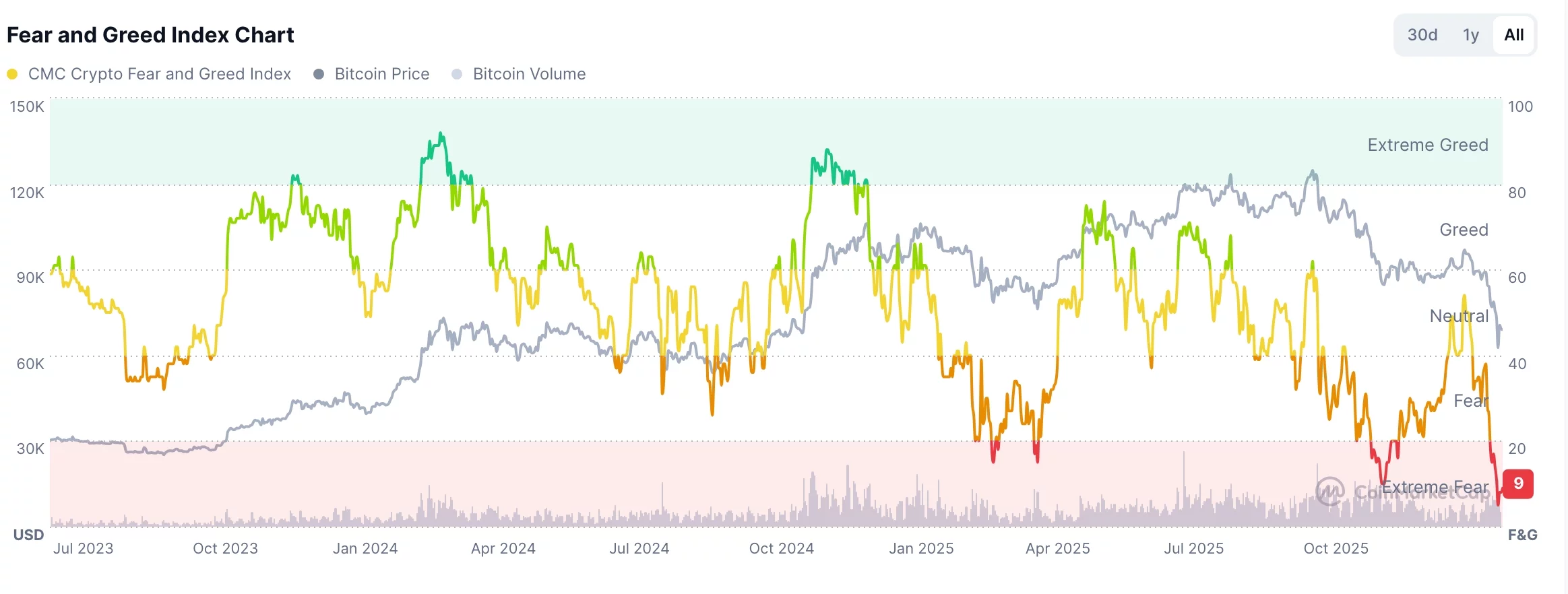
The crypto market remained on edge on Monday, Feb. 9, as the recent recovery faltered, and after China continued to decouple from the U.S.
Summary
- The crypto market remained under pressure on Monday as US government bond yields rose.
- China asked banks and other financial services in the country to reduce their exposure to U.S. debt.
- The futures open interest in the crypto industry continued to fall, while the Fear and Greed Index retreated.
Bitcoin (BTC) retreated below the key support level at $70,000, while the market capitalization of all tokens fell by 2.75% in the last 24 hours. The Crypto Fear and Greed Index remained in the extreme fear zone, while positions worth over $356 million soared to $356 million.
China urges banks to reduce exposure to US Treasuries
Bitcoin and the broader crypto market retreated on Monday as other risky assets pulled back. Futures tied to the Dow Jones and the Nasdaq 100 Index also retreated, paring back some of the gains made on Friday.
This price action happened as Chinese regulators asked financial institutions, including banks, to reduce their exposure to U.S. Treasuries. It also urged those with a high exposure to these assets to reduce them.
According to Bloomberg, the new measures have been framed as a way to diversify their risks rather than the ongoing geopolitical tensions between the two economies. Officials are worried that higher holdings of US Treasuries may expose these companies to higher volatility in the future.
China’s government has also continued selling its own US government bonds in the past few years. It now holds $682 billion in US Treasuries, down from over $1 trillion a few years ago.
Worse, some European governments also considered using their large holdings of U.S. Treasury securities as leverage during the recent Greenland crisis. Many European countries, such as the United Kingdom, Belgium, and Luxembourg, hold trillions of U.S. dollars in bonds.
Continued selling of U.S. Treasuries as the government debt has jumped, is one reason why long-term bond yields and gold prices have soared in the past few years. The 30-year rose to 4.90%, while the gold price jumped to above $5,000 as the rally continued.
Crypto Fear and Greed Index remains in the fear zone
Crypto market traders are still fearful that the recent plunge will resume. For one, the Crypto Fear Index has dropped to the extreme fear zone of 9.
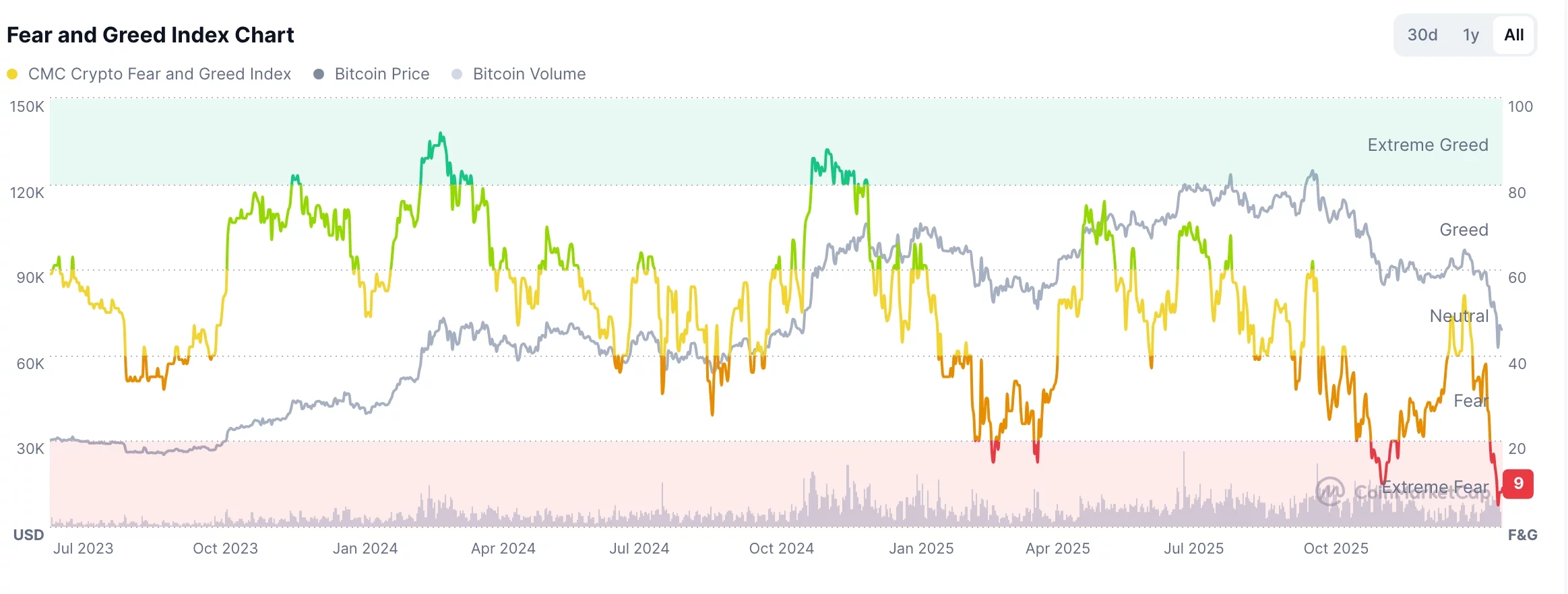
The volume in the crypto industry has also dropped sharply in the past few days. According to CoinMarketCap, trading volume dropped 12% over the last 24 hours to $100 billion.
Most importantly, futures open interest has retreated to $96 billion, down from last year’s high of over $255 billion. Falling futures open interest is a sign that investors are continuing their deleveraging, which often leads to lower crypto prices.
Crypto World
Bitcoin price low-volume bounce raises bull trap concerns
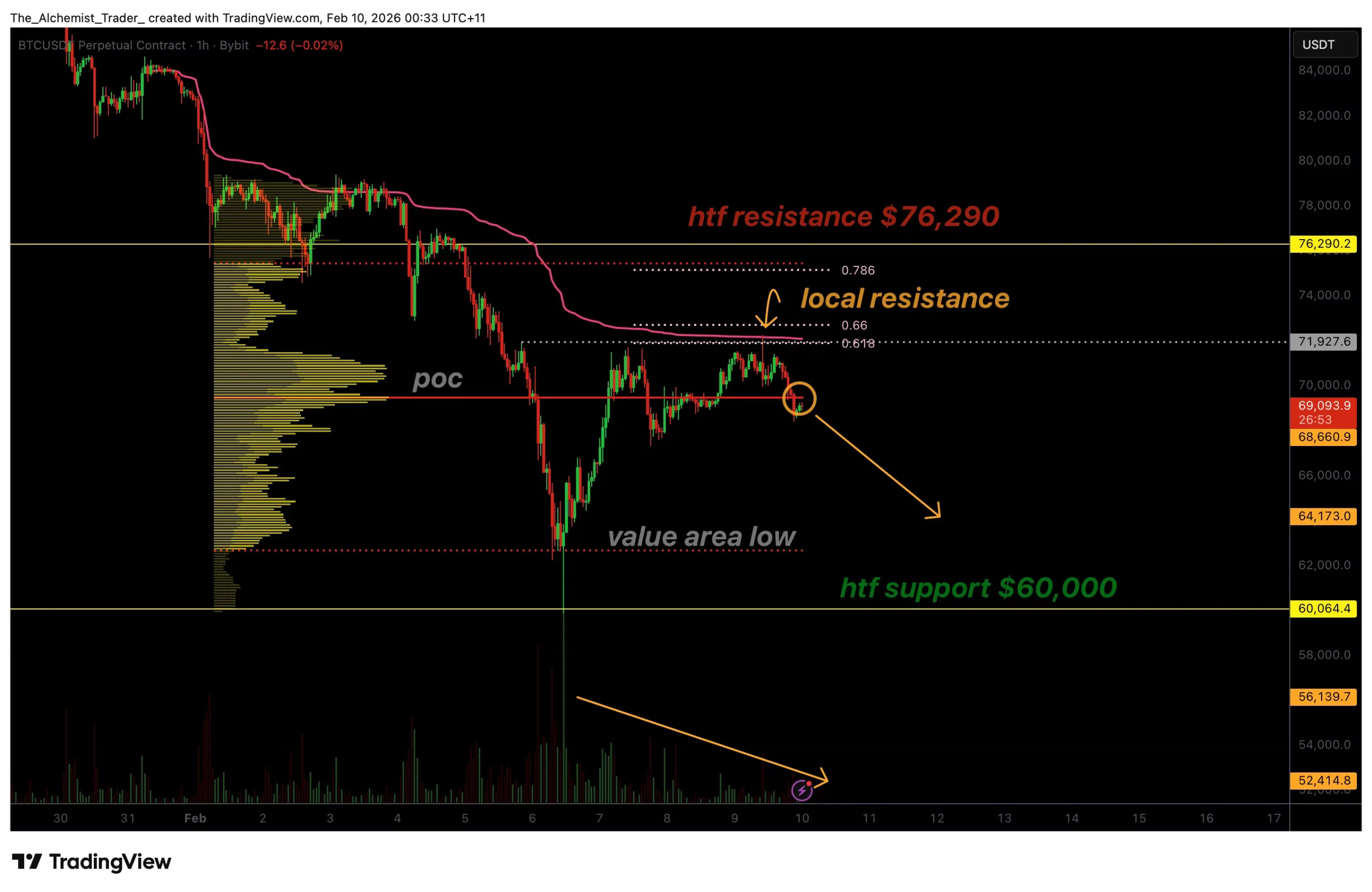
Bitcoin’s price has bounced from key support near $60,000, but declining volume and rising overhead resistance are raising concerns that the move may be a bull trap rather than a sustainable recovery.
Summary
- $60,000 support sparked the bounce, but demand remains weak
- Low volume and VWAP/Fibonacci rejection, signal fragile upside
- Acceptance below the point of control, favors rotation back toward support
Bitcoin (BTC) price action has staged a short-term rebound after successfully retesting a major high-timeframe support level near $60,000. While the bounce initially appeared constructive, deeper analysis reveals that the move higher has lacked strong participation.
Declining volume during the rally suggests that bullish momentum remains fragile, increasing the probability that the recent upside is corrective rather than trend-defining.
Bitcoin price key technical points
- $60,000 support has held, triggering a short-term bounce
- Rising price on declining volume, signaling weak bullish conviction
- Rejection at VWAP and 0.618 Fibonacci, reinforcing local resistance
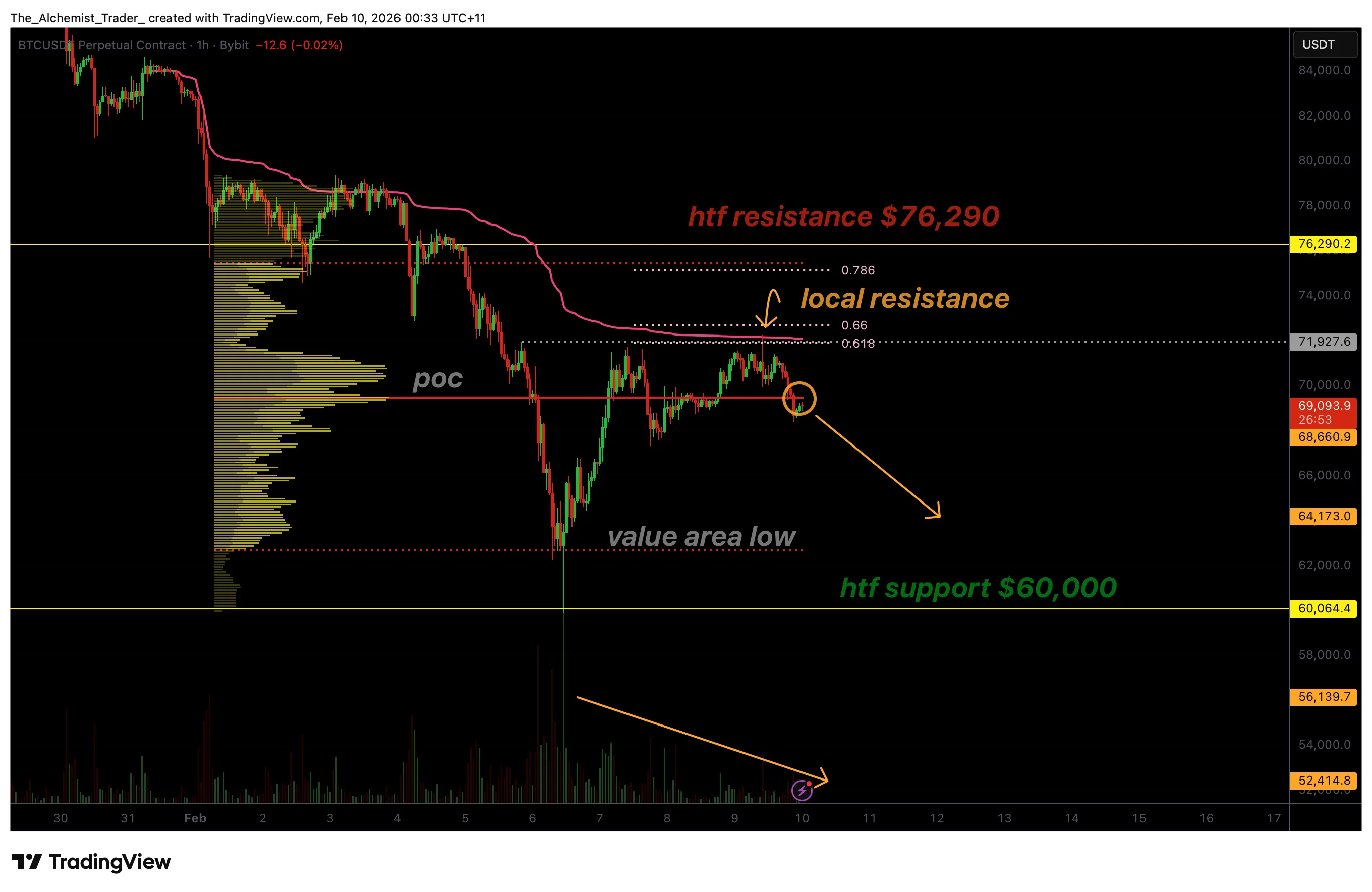
From a volume profile perspective, Bitcoin’s recent advance has occurred on noticeably declining volume. In healthy bullish reversals, price expansion is typically accompanied by increasing participation, reflecting strong demand and conviction from buyers. In contrast, the current rally lacks this confirmation, suggesting the move may be driven by short-covering or opportunistic buying rather than sustained accumulation.
This type of low-volume bounce often appears during corrective phases within broader bearish or range-bound environments. Without renewed volume expansion, the probability of follow-through remains limited, leaving price vulnerable to renewed selling pressure.
Rejection from key resistance levels
Technically, Bitcoin is now facing a strong confluence of resistance. The current rejection is occurring near the 0.618 Fibonacci retracement of the recent decline, an area that often acts as a decision point in corrective rallies. This level is reinforced by VWAP resistance, drawn from the recent swing high prior to the series of sharp sell-offs.
The combination of Fibonacci resistance and VWAP creates a high-probability supply zone. Price rejection from this area, particularly on weak volume, strengthens the case that sellers remain active and willing to defend higher levels.
Acceptance below the point of control
Another important development is Bitcoin’s inability to hold above the local point of control (POC). The POC represents the price level at which the highest trading volume has occurred and often serves as a market balance point.
Finding acceptance below this level suggests that sellers are regaining control and that the market is transitioning back into imbalance. Historically, acceptance below the POC following a low-volume rally increases the likelihood of a rotational move lower, especially when broader structure remains bearish or neutral.
Range rotation likely to continue
From a market structure perspective, Bitcoin appears to be trading within a developing high-timeframe range. The lower boundary of this range is defined by the $60,000 support, while the upper boundary sits near $76,200. Until price can break above resistance with strong volume confirmation, rotations within this range remain the higher-probability outcome.
Given the current rejection and lack of bullish participation, the probability favors a move back toward the lower end of the range. A rotation toward $60,000 would be consistent with range behavior and would test whether buyers can continue to defend this critical support.
What to expect in the coming price action
From a technical, price-action, and market-structure perspective, Bitcoin’s recent bounce shows signs of weakness. The combination of declining volume, rejection from key resistance, and acceptance below the point of control raises the risk that the move higher is a bull trap.
If selling pressure increases, Bitcoin is likely to rotate back toward the $60,000 region to retest high-timeframe support. A strong reaction from this level would keep the broader range intact, while failure to hold could expose deeper downside risk.
Crypto World
BMNR stock slowly preps rebound as key Ethereum metrics soar
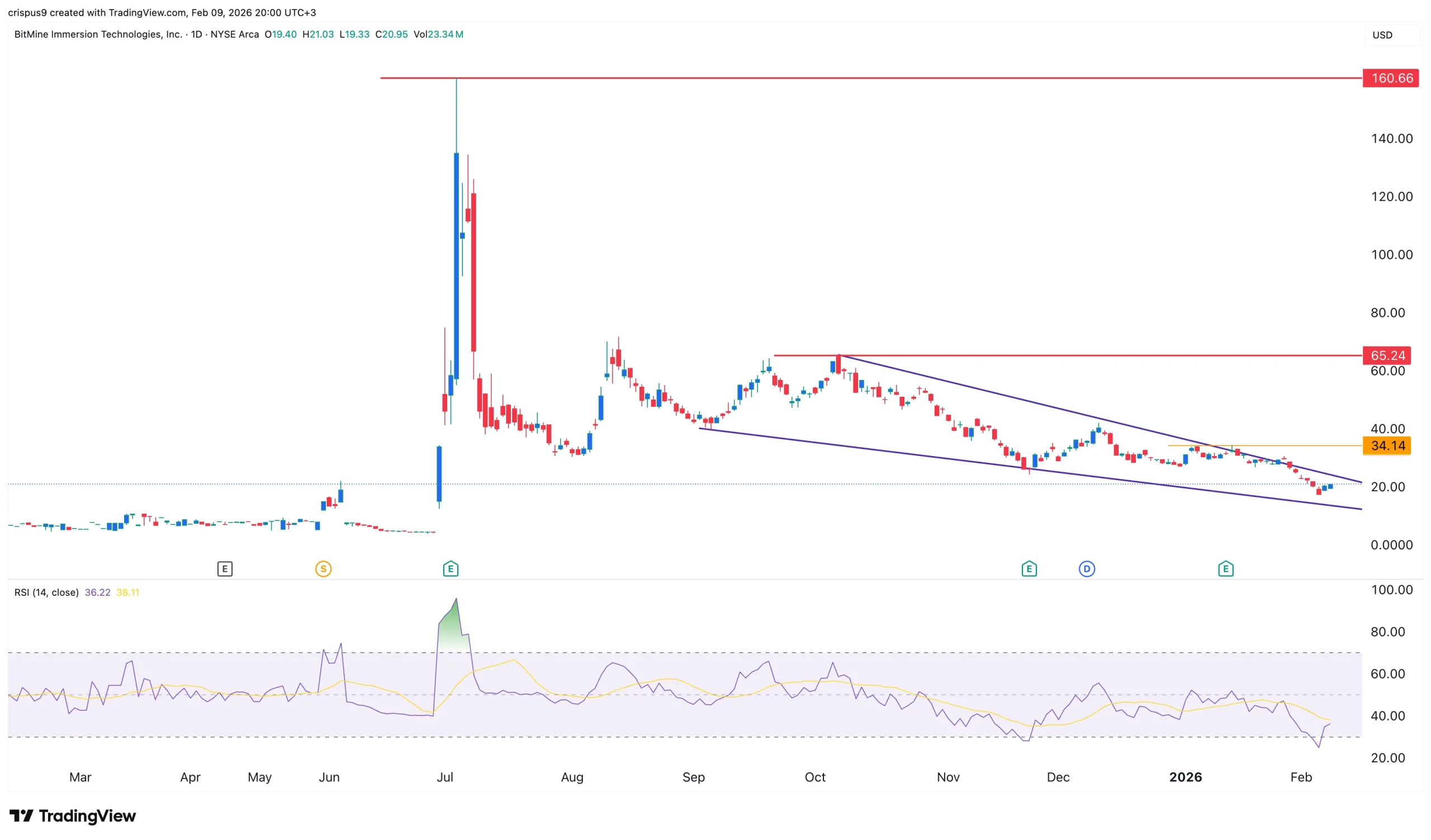
The BMNR stock price hovered at the crucial support level of $20 as BitMine continued to accumulate Ethereum, and its fundamentals improved.
Summary
- BitMine’s stock price has formed a falling wedge pattern, pointing to a rebound.
- Data shows that Ethereum’s transactions and network fees have soared recently.
- The supply of ETH tokens in exchanges has continued falling this month.
BitMine stock has retreated by over 85%from its highest level in July last year. It is also slowly forming the highly bullish falling wedge pattern, pointing to a strong rebound.
In a statement, Tom Lee’s BitMine said that it continued to buy Ethereum (ETH) tokens last week, bringing its total holdings to over 4.326 million. It also holds 193 Bitcoin (BTC) and nearly $600 million in cash. Its other assets include $200 million in Beast Industries and $19 million in Eightco Holdings, a company that has invested in Worldcoin.
BitMine stock may ultimately benefit from Ethereum’s fundamentals, which have continued improving in the past few months, with third-party data showing relentless growth. Ethereum transactions, fees, and active addresses have continued to soar over the past few months, a trend that has accelerated after the Fusaka upgrade.
More data show that the amount of staked Ethereum continues to rise. The staking queue has jumped to over 4 million coins, with entry rising to over 70 days. Rising staking inflow is a sign that demand continues rising.
At the same time, data show that the supply of ETH tokens on exchanges has continued to fall and is now at its lowest level since 2016.
BMNR stock price prediction: Technical analysis
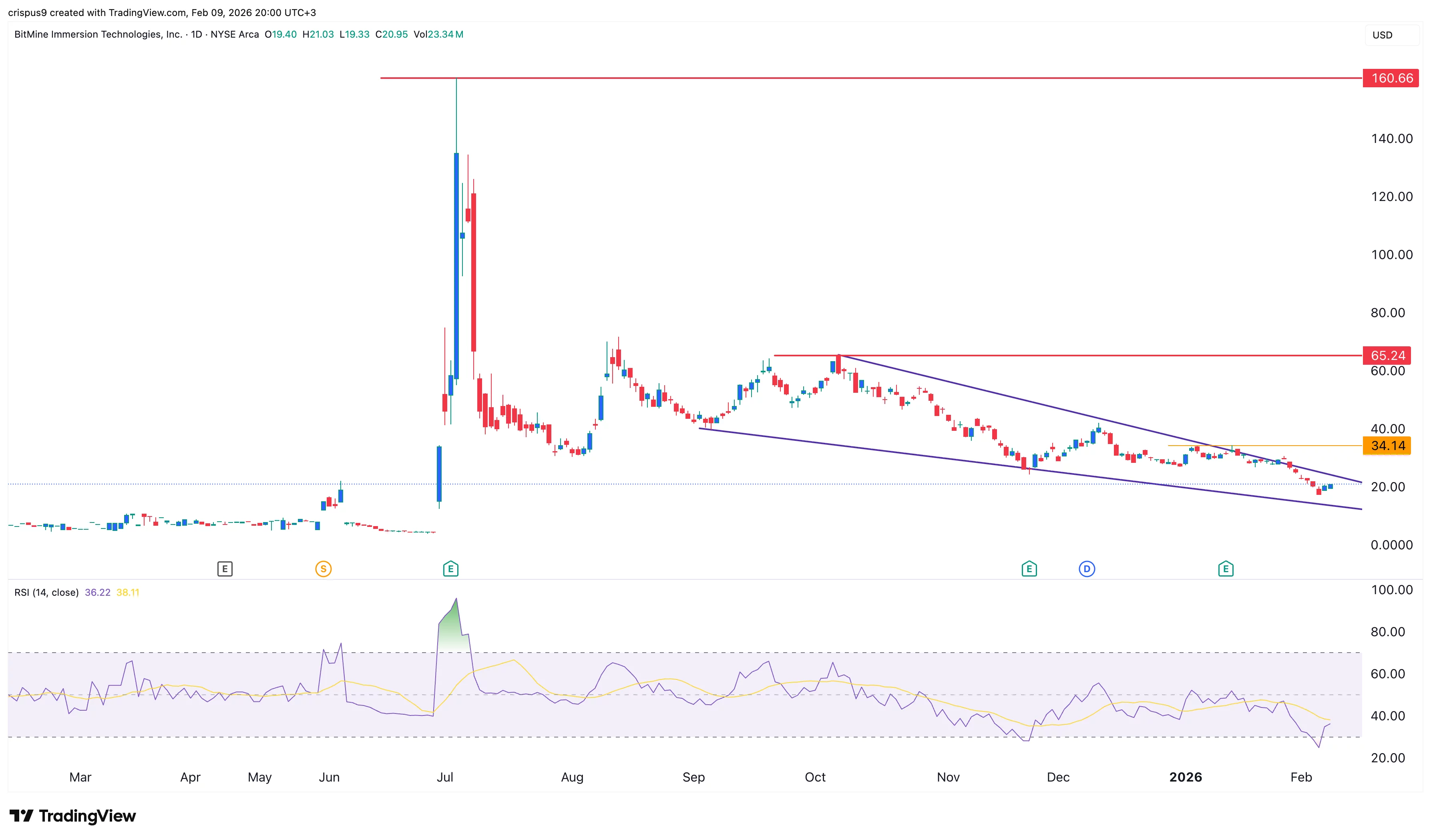
The daily timeframe chart shows that the BitMine stock price has been in a strong downward trend in the past few months. It plunged from a record high of $160 to the current $20.
On the positive side, the coin has formed a falling wedge pattern, which consists of two descending and converging trendlines.
This wedge is nearing its confluence, which could lead to a rebound soon. Also, the Relative Strength Index has moved from the oversold level of 30 to the current 32.
Therefore, the stock will likely have a strong bullish breakout in the coming days, potentially to the key resistance level at $35, its highest level in January this year.
On the other hand, a move below the lower side of the wedge will point to more downside in the near term.
Crypto World
South Korea’s FSS Launches AI-Powered Crackdown on Crypto Market Manipulation

TLDR:
- FSS targets whale trading, cage methods, and racehorse schemes in planned 2026 market investigations
- AI-powered systems will analyze abnormal price surges within seconds to identify manipulation patterns
- Digital Asset Basic Act preparatory team established to support phase-2 virtual asset legislation
- New licensing manuals developed for digital asset service providers and stablecoin issuers nationwide
South Korea’s Financial Supervisory Service announced comprehensive plans to investigate virtual asset market manipulation on February 9.
The regulatory body outlined targeted enforcement actions against high-risk trading schemes that disrupt market order.
The FSS will deploy artificial intelligence tools to detect abnormal price movements and suspicious trading patterns.
A preparatory team for the Digital Asset Basic Act was also established to support upcoming phase-2 legislation implementation.
Planned Investigations Target High-Risk Market Manipulation Schemes
The FSS identified several manipulation methods as priority investigation targets for 2026. Whale trading operations that deploy substantial capital for coordinated buy-and-sell activities will face increased scrutiny.
The cage method, which artificially controls prices of assets with suspended deposits on specific exchanges, represents another enforcement focus.
Racehorse schemes that rapidly inflate prices through concentrated buying at predetermined times also made the list.
Market manipulation through application programming interface orders presents additional concerns for regulators. The automated nature of API-based trading allows manipulators to execute complex strategies at scale.
Social media platforms have become tools for spreading false information about virtual assets. These coordinated misinformation campaigns can trigger artificial price movements and harm retail investors.
The FSS plans to develop sophisticated detection capabilities using artificial intelligence technology. The new system will analyze virtual assets experiencing abnormal price surges within seconds or minutes.
Automated extraction functions will identify suspect trading periods and participant groups. Text analysis powered by AI will examine communications and social media posts for manipulation indicators.
Fraudulent transactions remain a persistent threat to market integrity and investor protection. The combination of human oversight and technological tools aims to create a more robust enforcement framework.
Regular monitoring of high-risk trading patterns will enable faster regulatory responses. The FSS expects these measures to deter potential manipulators and restore confidence in virtual asset markets.
Digital Asset Framework Prepares for Phase-2 Legislative Implementation
The Financial Supervisory Service recently formed a preparatory group for the Digital Asset Basic Act. This team will support the effective rollout of phase-2 virtual asset legislation currently under development.
The preparatory group’s mandate includes creating comprehensive regulatory frameworks for market participants.
Coordination with lawmakers and industry stakeholders will ensure practical implementation of new legal requirements.
Disclosure systems for virtual asset issuance and transaction support are under active development. The preparatory team will establish standardized reporting requirements for token launches and trading platforms.
Transparency measures aim to provide investors with essential information for informed decision-making. Clear disclosure standards will also help distinguish legitimate projects from potentially fraudulent schemes.
Licensing review procedures for digital asset operators and stablecoin issuers require detailed operational manuals. The FSS will create guidelines covering application processes, compliance requirements, and ongoing obligations.
Stablecoin issuers face particular scrutiny given their role in maintaining price stability mechanisms. Digital asset service providers must demonstrate adequate technical capabilities and financial stability for licensure.
The regulatory body plans to enhance virtual asset exchange fee management and disclosure practices. Current fee structures lack standardization across different trading platforms and service types.
Refined disclosure requirements will enable users to compare costs across exchanges more effectively. The FSS believes transparent fee structures will promote healthy competition and rational consumer choices.
Better fee management should reduce barriers to entry for new market participants while protecting existing users.
Crypto World
Only 130M BDAG Left in BlockDAG’s $0.00025 Entry As DOGE & XRP Chase Gains

2026’s crypto market continues to navigate a period of uncertainty, with volatility, macro pressure, and shifting liquidity shaping short-term price action across major assets. As sentiment stabilizes, traders are closely watching key support zones.
Within this environment, Dogecoin price today is showing signs of stabilization after defending a long-term support range, while the XRP price prediction remains cautious amid ongoing downside pressure and weakening technical momentum. Both assets reflect the broader market’s search for direction.
At the same time, attention is turning toward early-stage opportunities like BlockDAG (BDAG). As it approaches its February 16 exchange launch, its final private sale phase, fixed pricing, and early access structure are drawing interest from traders looking beyond short-term volatility and serious gains..
Target Recovery for Dogecoin Price Today at 0.15
Analysts believe Dogecoin price today is entering a stabilization phase after hitting a long-term support base between 0.105 and 0.110. This specific zone has historically acted as a springboard for multi-month growth during past market cycles. Technical indicators suggest the current Dogecoin price today represents a generational accumulation zone with a very favorable risk-to-reward ratio.
 While resistance levels at 0.135 and 0.150 currently cap the upside, the lack of aggressive selling suggests buyers are absorbing the available supply. If the support holds, Dogecoin price today could be positioned for a steady recovery toward its 0.15 target as speculative excess leaves the market.
While resistance levels at 0.135 and 0.150 currently cap the upside, the lack of aggressive selling suggests buyers are absorbing the available supply. If the support holds, Dogecoin price today could be positioned for a steady recovery toward its 0.15 target as speculative excess leaves the market.
Bearish Targets for XRP Price Prediction at 1.00
The current XRP price prediction remains cautious as the asset faces significant downward pressure after crashing 35% from its yearly peak. Despite Ripple securing new licenses in Europe and the UK, and real-world assets on the ledger growing by 270% to 1.47 billion, technical momentum is fading. Technical indicators like the RSI falling to 30 suggest the token is oversold but still vulnerable to further selling.

Looking ahead, the XRP price prediction centers on critical support levels at 1.37 and 1.15 to determine if a rebound is possible. If the current bearish momentum persists and the price breaks below 1.37, analysts warn of a potential crash toward the 1.00 psychological milestone. While institutional interest remains high with 1.3 billion in total inflows, the short-term outlook depends on market stabilization.
Final Countdown: Secure Your 100% Unlocked BDAG Before Feb 16
BlockDAG is entering its final private sale stage at $0.00025 per token, just ahead of its confirmed exchange debut on February 16 at $0.05. This steep pricing gap highlights a shrinking opportunity for early positioning before public trading fully determines valuation.
The project has already secured over $452 million in funding, underscoring strong demand and long-term backing. With only 130 million tokens remaining in this last allocation, the private sale is approaching its definitive end as availability tightens rapidly.
What sets this phase apart is its simplicity and transparency. There are no vesting periods, unlock schedules, or delayed withdrawals. Buyers receive 100% of their tokens directly into their wallets on launch day, ensuring immediate access, full liquidity, and complete control from the outset.
Participants in the private round also gain a meaningful timing advantage, with up to nine hours of early trading access before public markets open. This window allows holders to observe initial liquidity, assess price behavior, and position calmly before wider participation accelerates volatility and demand.
As the February 16 launch draws closer, BlockDAG completes its shift from development to a live market asset. Once the final allocation is filled, private access closes permanently. For investors researching the next big crypto, the combination of early access, instant delivery, and a potential 200× pricing gap defines a closing window that will not reopen.
Key Takeaways
Dogecoin and XRP reflect two very different phases of the current market. Dogecoin price today shows early signs of stabilization after defending a critical long-term support zone, suggesting recovery potential if buying pressure continues to build. In contrast, the XRP price prediction remains cautious, with downside risks still present.
But only one project stands out with a time-sensitive opportunity. What analysts are now calling the next big crypto, BlockDAG, offers a final private sale at $0.00025 before a confirmed $0.05 exchange launch, only 130M tokens left, zero vesting, and up to nine hours of early trading access. With a potential 200× pricing gap and permanent closure once filled, the urgency is real.
Private Sale: https://purchase.blockdag.network
Website: https://blockdag.network
Telegram: https://t.me/blockDAGnetworkOfficial
Discord: https://discord.gg/Q7BxghMVyu
Disclaimer: This is a Press Release provided by a third party who is responsible for the content. Please conduct your own research before taking any action based on the content.
-

 Video7 days ago
Video7 days agoWhen Money Enters #motivation #mindset #selfimprovement
-

 Tech5 days ago
Tech5 days agoWikipedia volunteers spent years cataloging AI tells. Now there’s a plugin to avoid them.
-
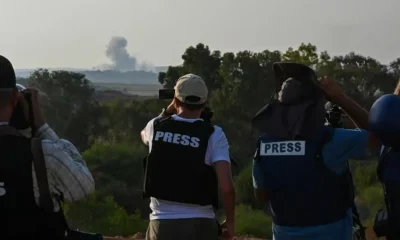
 Politics1 day ago
Politics1 day agoWhy Israel is blocking foreign journalists from entering
-
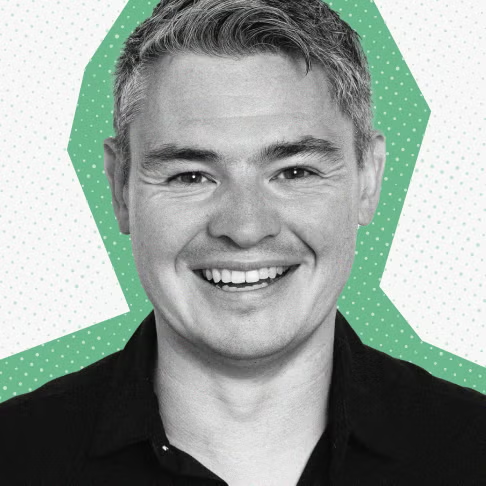
 Sports3 days ago
Sports3 days agoJD Vance booed as Team USA enters Winter Olympics opening ceremony
-
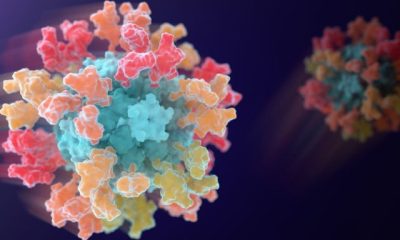
 Tech3 days ago
Tech3 days agoFirst multi-coronavirus vaccine enters human testing, built on UW Medicine technology
-

 NewsBeat19 hours ago
NewsBeat19 hours agoWinter Olympics 2026: Team GB’s Mia Brookes through to snowboard big air final, and curling pair beat Italy
-

 NewsBeat6 days ago
NewsBeat6 days agoUS-brokered Russia-Ukraine talks are resuming this week
-
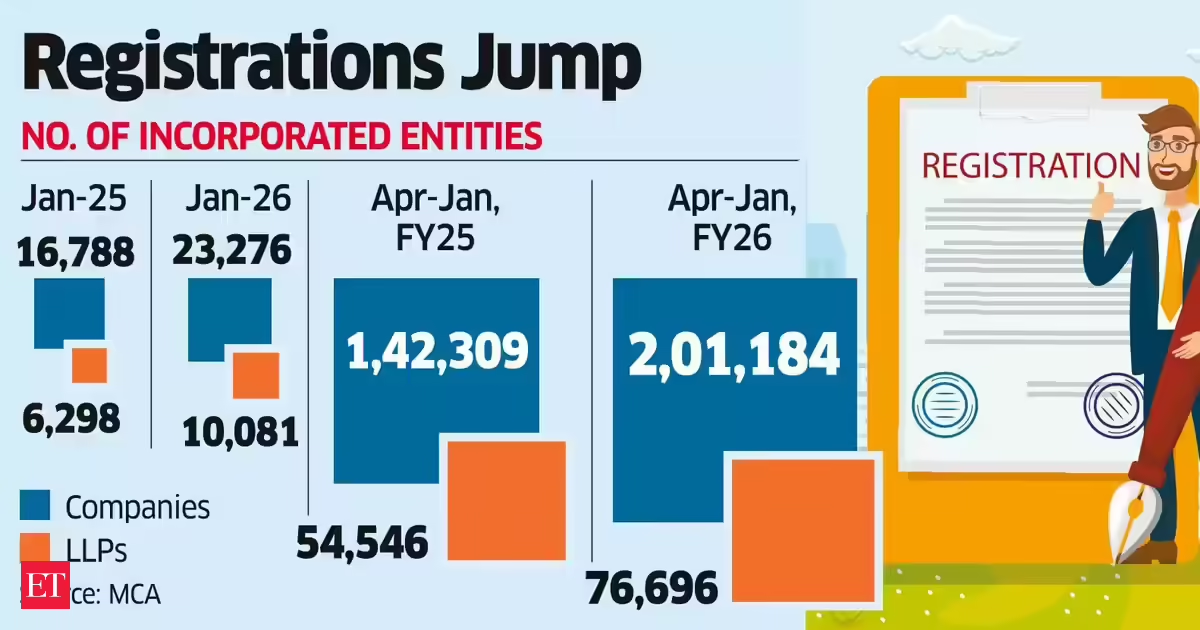
 Business1 day ago
Business1 day agoLLP registrations cross 10,000 mark for first time in Jan
-

 Sports14 hours ago
Sports14 hours agoBenjamin Karl strips clothes celebrating snowboard gold medal at Olympics
-
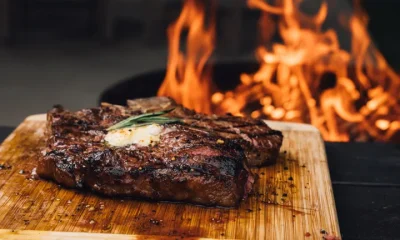
 Politics1 day ago
Politics1 day agoThe Health Dangers Of Browning Your Food
-
Sports2 days ago
Former Viking Enters Hall of Fame
-
Sports3 days ago
New and Huge Defender Enter Vikings’ Mock Draft Orbit
-

 Business1 day ago
Business1 day agoJulius Baer CEO calls for Swiss public register of rogue bankers to protect reputation
-
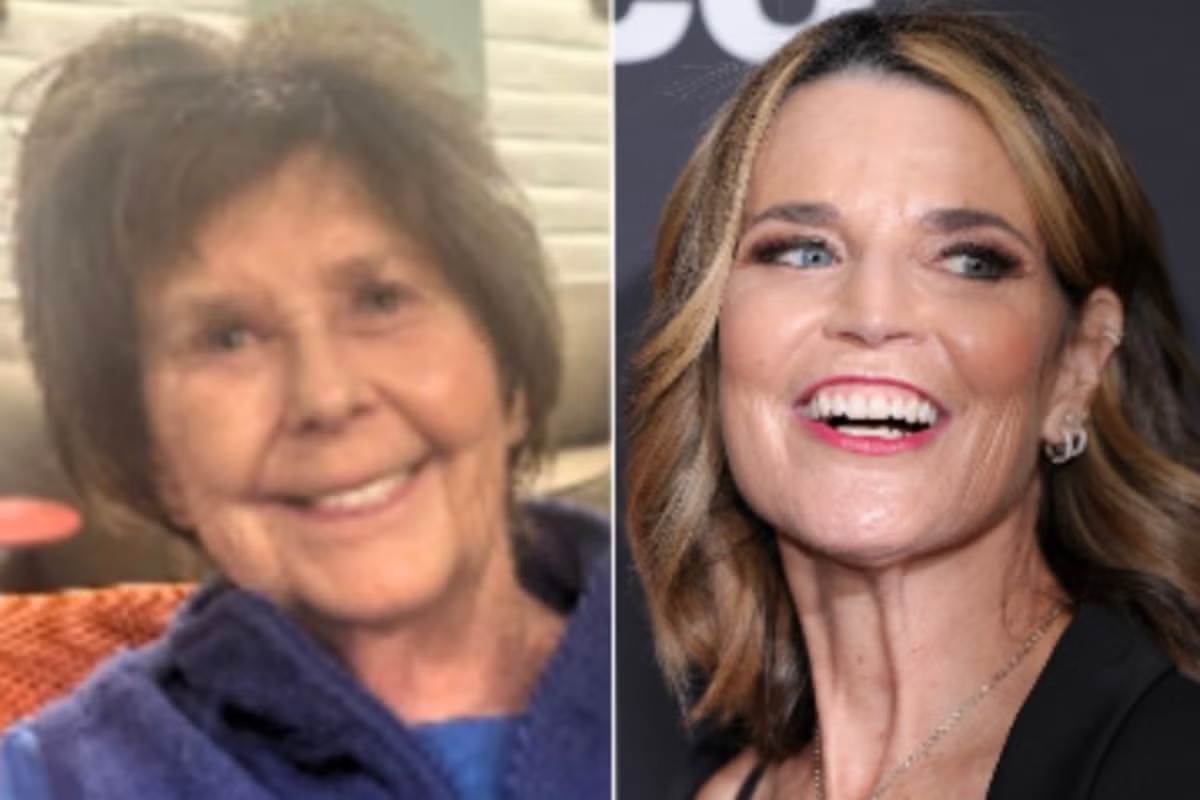
 NewsBeat3 days ago
NewsBeat3 days agoSavannah Guthrie’s mother’s blood was found on porch of home, police confirm as search enters sixth day: Live
-

 Business4 days ago
Business4 days agoQuiz enters administration for third time
-
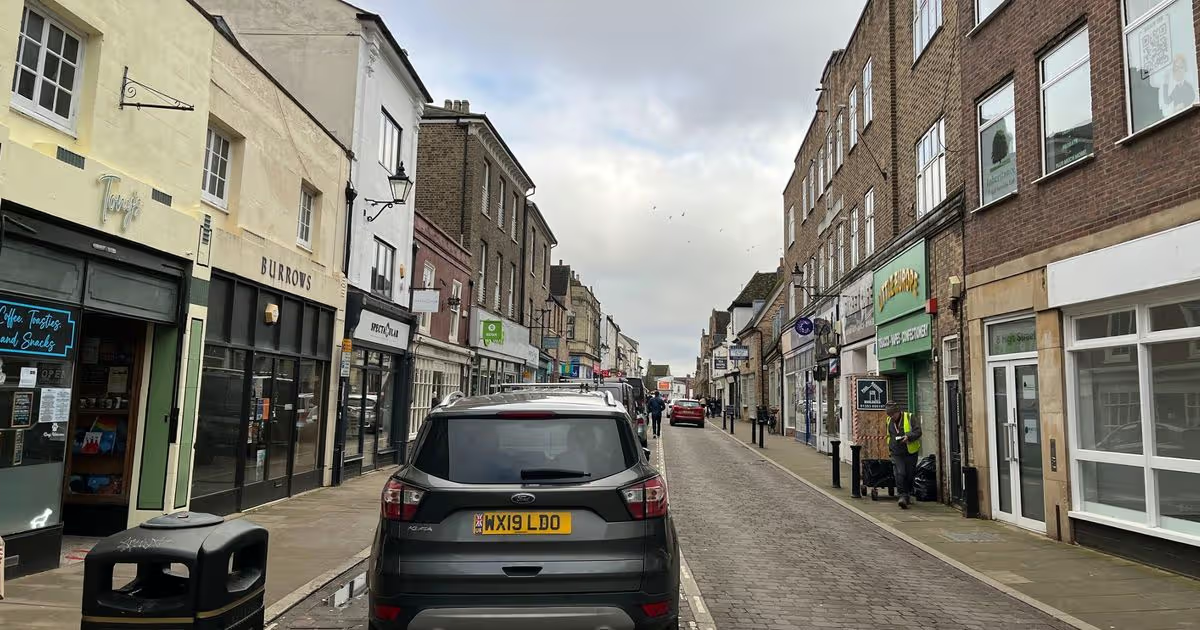
 NewsBeat9 hours ago
NewsBeat9 hours agoResidents say city high street with ‘boarded up’ shops ‘could be better’
-

 NewsBeat4 days ago
NewsBeat4 days agoStill time to enter Bolton News’ Best Hairdresser 2026 competition
-
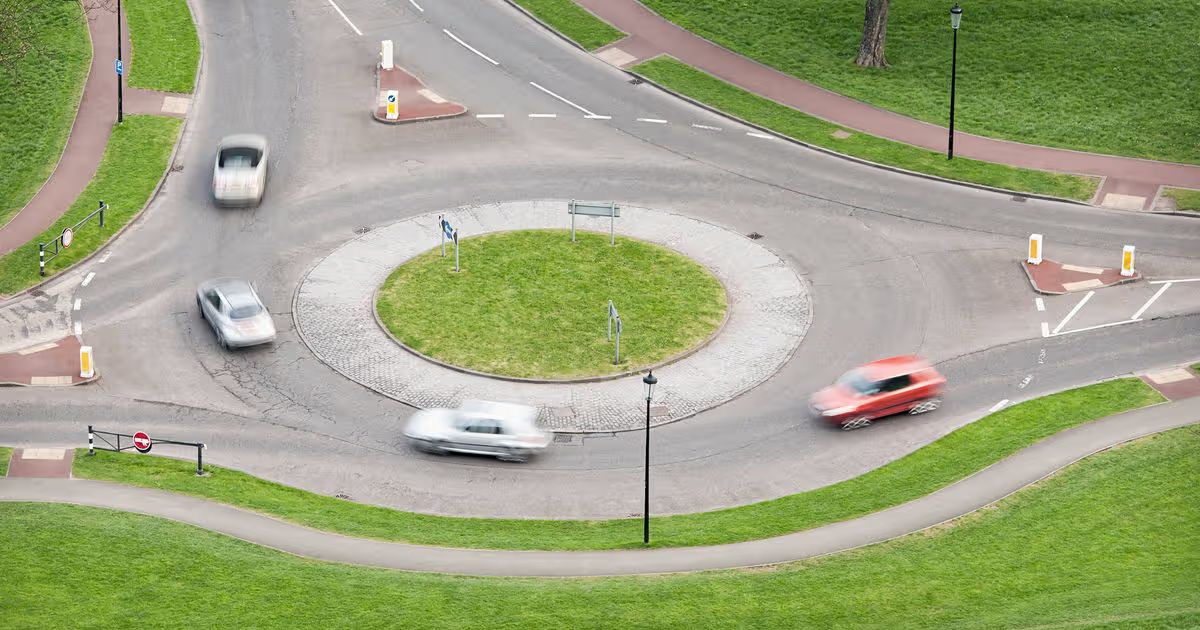
 NewsBeat3 days ago
NewsBeat3 days agoDriving instructor urges all learners to do 1 check before entering roundabout
-

 Crypto World6 days ago
Crypto World6 days agoRussia’s Largest Bitcoin Miner BitRiver Enters Bankruptcy Proceedings: Report
-
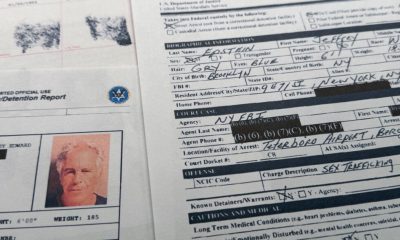
 NewsBeat7 days ago
NewsBeat7 days agoImages of Mamdani with Epstein are AI-generated. Here’s how we know









